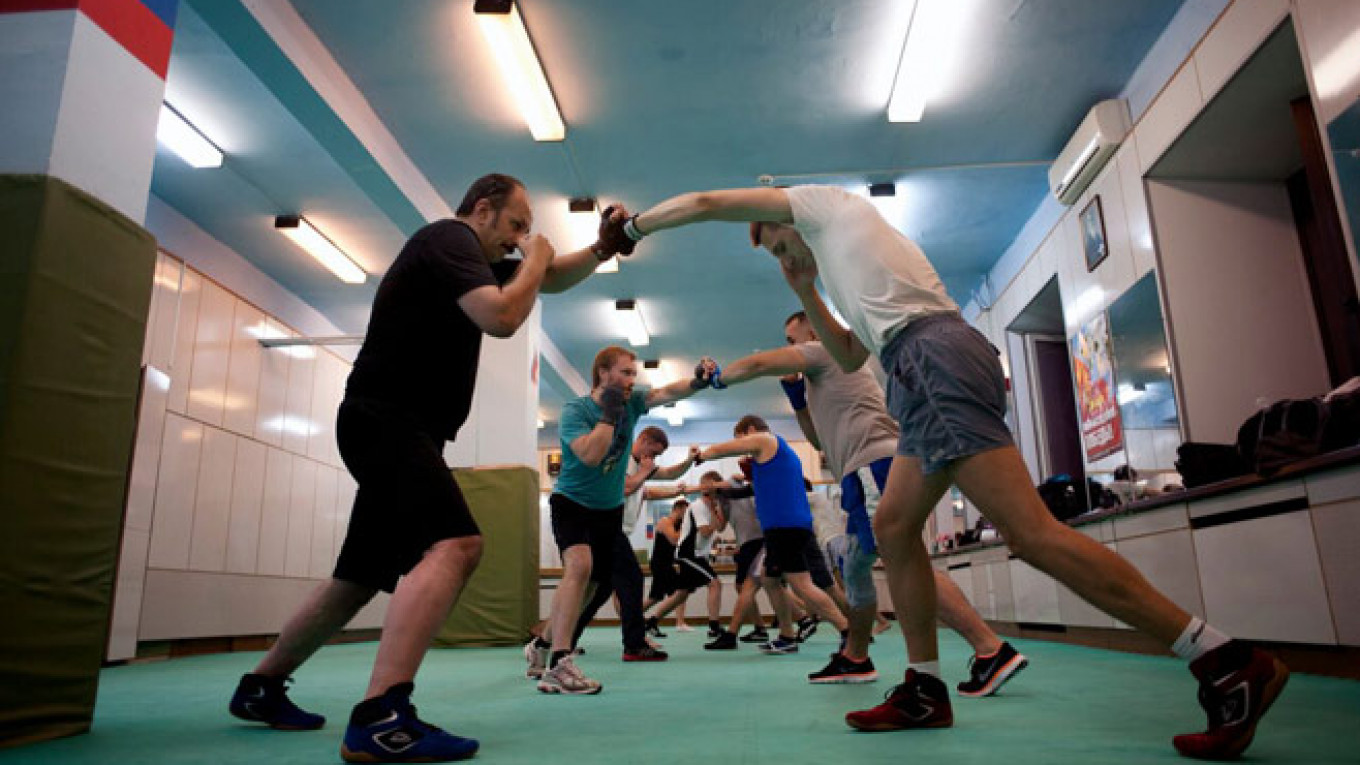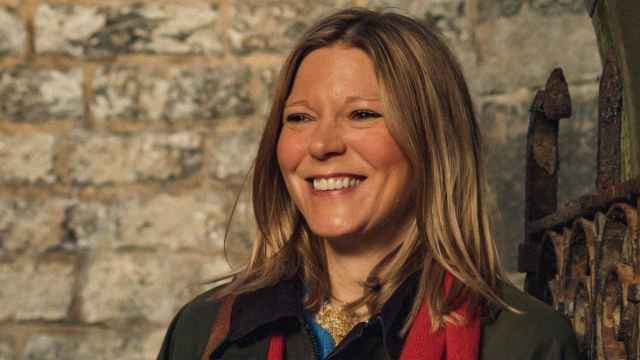It's 10 p.m. in a fitness club on a quiet side street near the Kitai-Gorod metro station in central Moscow, and a group of guys are warming up for their training. Sergei, a muscular blond trainer, gets the session going. The program starts with running laps around the room. Then somersaults. Then cartwheels, then front handsprings, then back handsprings. That's just the first 10 minutes.
"Look sharp!" Sergei shouts to the group. 'They're taking pictures!"
See the photo gallery: Turning Businessmen into Street Fighters One Punch at a Time
It's the evening class at Drugoi Boi, or "Another Kind of Fight" in English. Sergei is training his students in a new style of martial arts that's becoming popular in Moscow. It focuses on how to street fight.
During the lesson, I sat down in the locker room with the club's founder, Dmitry Bolshoi, a 36-year-old sportsman and self-styled philosopher.
Q: What's the philosophy behind Drugoi Boi?
A: We want our students to be free — to be themselves mentally and physically. I believe that everything starts with consciousness and your mentality. For me personally, it's useless if nothing has been done on the inside. That's why I started Drugoi Boi — to help people self-actualize.
Q: Where did you get your techniques?
A: Straight from the street. I grew up on the Arbat in the '90s — it was a tough time then and street fighting was a common thing. After so many fights, you figure out what works and what doesn't. Usually a person comprehends the science of martial arts in the gym and in the ring. All his sports experience makes him assume that in a real fight, he'll do well. We studied sports training and fighting on the street, and invented a method to teach others the art of combat. The main principle is simple: attack. Don't maneuver or run away. Blow up in response to attacks. Use all parts of your body — fists, feet, elbows, knees, head.
Q: How long is your program?
A: You don't need to become a professional athlete and spend a lot of time. Our techniques are simple and effective. In the first six months you will become physically fit and strong, and after one year you'll be able to fight better than most everybody else on the street.
Q: How many of your students actually use their training in real fights?
A: I can't say for sure — probably not many. Just because we train you for street fights doesn't mean we want you to get into them, or that we advocate violence. I personally see many explanations for a fight that's poorly thought out. Drugoi Boi is about becoming a better version of yourself, not just becoming a great fighter.
Q: Who are your students?
A: They're average guys. Because our classes are held at night, a lot of them are coming from work and want to blow off some steam. Most of them have little fighting experience, but I love teaching the weak. The weak person accepts his weaknesses better than a strong person. The strong man is so accustomed to destroying weaknesses that he can't understand that he has them.
Q: How many women are enrolled in your program?
A: None. As a rule, we don't take them. I personally don't like to see them get beat up.
Q: Why do you think street fighting has become so popular in Russia over the last decade?
A: [laughs] Street fighting has always been popular in Russia. We've got a very military culture, with conscription and everything, so most guys know something about fighting. But I think the growing popularity of mixed martial arts and the UFC — Ultimate Fighting Championship — on television also has something to do with it.
Q: Why do you think Russians have such a reputation for being tough?
A: Again, I think it's related to our military culture. For me, growing up in the '90s was difficult and getting into fights was an ordinary thing. The authorities weren't exactly looking after people, so naturally we got used to taking care of ourselves and families. We've got one guy from Dagestan here, and he'll tell you about the situation there. Fighting is a part of life, you get it from childhood.
Drugoi Boi offers classes near Kitai-Gorod metro station on Tuesdays and Thursdays from 10:15 p.m. until midnight, and near Lubyanka metro station from 8 p.m. until 9:45 p.m. Membership costs 6,000-7,000 rubles ($91-106) per month. You can sign up for a trial lesson and learn more at their website openclass.drugoiboi.ru.
Contact the author at artsreporter@imedia.ru
A Message from The Moscow Times:
Dear readers,
We are facing unprecedented challenges. Russia's Prosecutor General's Office has designated The Moscow Times as an "undesirable" organization, criminalizing our work and putting our staff at risk of prosecution. This follows our earlier unjust labeling as a "foreign agent."
These actions are direct attempts to silence independent journalism in Russia. The authorities claim our work "discredits the decisions of the Russian leadership." We see things differently: we strive to provide accurate, unbiased reporting on Russia.
We, the journalists of The Moscow Times, refuse to be silenced. But to continue our work, we need your help.
Your support, no matter how small, makes a world of difference. If you can, please support us monthly starting from just $2. It's quick to set up, and every contribution makes a significant impact.
By supporting The Moscow Times, you're defending open, independent journalism in the face of repression. Thank you for standing with us.
Remind me later.






